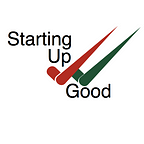Realities & Potential of AI for Good
Promising AI Applications from #SkollWF
Explore additional insights from our comprehensive conference coverage of the 2024 Skoll World Forum.
Artificial intelligence (AI) emerged as a hot topic at this year’s Skoll World Forum, with a dedicated session exploring its potential to accelerate progress on the world’s most pressing challenges. Since our StartingUpGood team is committed to harnessing innovation for social good, we wanted to share some key takeaways and recommendations from this thought-provoking discussion.
Key Takeaways
The State of AI for Social Impact
Panelists from Amini, Reach Digital Health, Digital Green, and Civis discussed both the promises and pitfalls of AI in the social sector. While AI has made significant strides in recent years, it’s important to understand its limitations. As moderator Shashi Buluswar noted, current AI is essentially sophisticated pattern recognition, not true intelligence, and its outputs are only as good as the data it’s trained on.
This is a major challenge for applying AI in many developing regions and for marginalized populations, where there is a severe lack of digitized, representative data. Kate Kallot of Amini highlighted that in Africa, even basic data like weather records are often incomplete or inaccessible. Without robust, localized data, AI risks producing biased or inaccurate results that could do more harm than good.
Promising AI Applications
Despite these challenges, the panelists showcased several promising ways AI is being used to enhance social programs:
- Reach Digital Health (formerly Praekelt.org) is using AI chatbots to provide personalized maternal health information to women in South Africa, customized to their stage of pregnancy and specific risk factors.
- Digital Green has made their agricultural training videos more accessible to farmers by using AI to automatically match natural language queries to relevant clips.
- Civis is leveraging AI to make complex legislation easier for citizens to understand and to efficiently analyze public input to improve policies.
- Amini is aggregating environmental, climate and economic data to generate localized insights for smallholder farmers, agribusinesses and policymakers.
These examples illustrate how AI can extend the reach and impact of strained social sector resources. However, the panelists emphasized that AI should be viewed as a tool to augment human efforts, not a silver bullet solution. Rikin Gandhi of Digital Green cautioned that AI investments must not come at the expense of building foundational physical and social infrastructure.
As Debbie Rogers of Reach Digital Health summarizes:
AI is everywhere. Everyone wants to sprinkle some AI onto something… But think very carefully. Is this a hammer looking for a nail or are you actually solving a problem where AI is going to change your impact? And that’s really where you want to be able to invest in AI.
Challenges and Considerations
- Lack of sufficient, representative data for many regions and marginalized populations
- Risk of biased, inaccurate or harmful outputs if AI is trained on wrong data or applied out of context
- Potential for exploitation or unintended negative consequences, especially for vulnerable groups
- Importance of defining a clear problem to solve, not just pursuing AI for its own sake
- Need for interpretability, transparency, human oversight to catch and correct mistakes
- Developing ethical guidelines and safeguards against misuse
Recommendations for Ethical AI
For impact investors and founders looking to responsibly leverage AI, the panelists offered several recommendations:
- Prioritize projects that address clear needs of vulnerable populations. Avoid developing AI for its own sake without a target problem and beneficiaries in mind.
- Invest heavily in gathering comprehensive, representative data. Partner with local organizations to digitize existing records and collect new data points needed to train effective models.
- Rigorously test for fairness, robustness and potential unintended consequences. Have clear protocols for human oversight and ability to override AI outputs as needed.
- Prefer open source, interoperable tools over proprietary black boxes. Democratizing access will accelerate innovation and impact across the ecosystem.
- Engage diverse stakeholders, especially representatives from affected communities, in the design, deployment, and governance of AI systems. Proactively develop ethical guidelines and accountability measures.
Antaraa Vasudev of Civis captured the onus on the social impact community to proactively shape the trajectory of AI:
“I think there’s a lot of conversation around AI, some of it good, some of it a little bit scary. But I think one of the reasons for optimism and one of the opportunities that I see that exists today is that we finally have an opportunity to co-create, we have a new and emerging tool that each of us can help shape. We have a new and emerging tool that each of us can help build the guardrails for.”
Looking Ahead
As AI continues to advance at a breakneck pace, the social impact sector has a narrow window to influence its development to maximize benefits for people and planet. While not a panacea, AI could be a powerful accelerant for the Sustainable Development Goals if steered in the right direction. This will require unprecedented collaboration between technologists and practitioners, visionary impact capital, strong ethical frameworks, localized data infrastructure, and a commitment to participatory design. If we get it right, AI could be an invaluable tool in our collective work to solve global challenges.
Featured Speakers
Learn More
Watch this session in its entirety and explore additional #SkollWF 2024 sessions on the organization’s YouTube channel.
Our StartingUpGood team believes that events and conferences are great places to learn, share ideas, and innovate. We are committed to using our innovative tech tools to share key insights and learnings from top conferences. This article uses Otter.ai to create transcripts and various LLMs to generate content summaries. All work is hand-checked for quality.
StartingUpGood supports fresh entrepreneurial approaches to social impact. FOLLOW US on social media:
Check out SDGCounting for the latest news on tracking the progress of the Sustainable Development Goals. #SDGs #GlobalGoals
